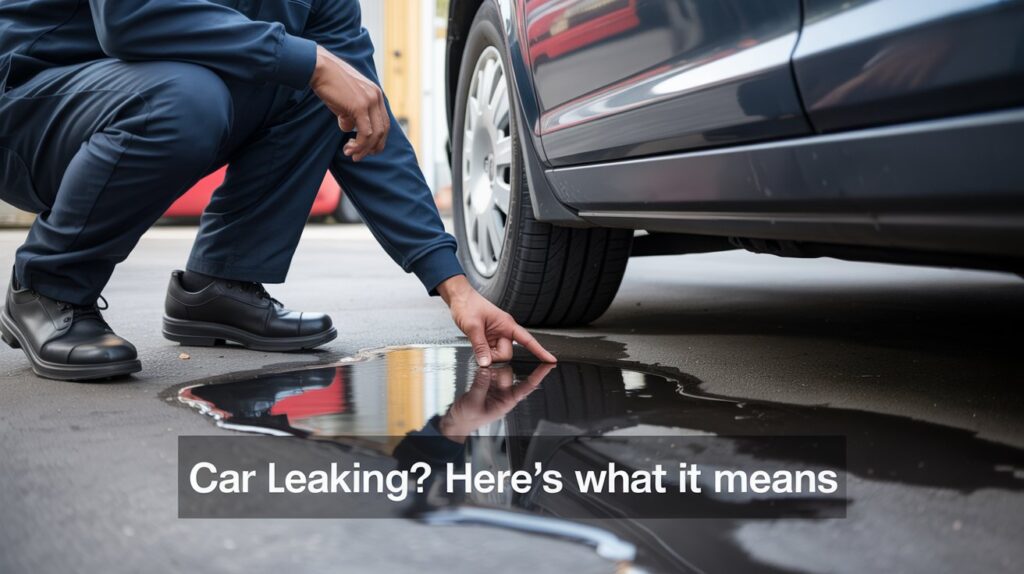Finding a puddle under your vehicle can be frustrating and sometimes alarming. While some leaks are relatively harmless, others may point to serious issues that affect your car’s reliability, safety, and performance. Identifying the source of a leak early can help prevent costly repairs and keep your car running smoothly.
Leaks usually come from gaskets, seals, or fuel system components. Something as small as a worn water pump gasket can cause major cooling issues, while an oil leak can lead to engine damage if ignored. By learning the most common sources of leaks, you’ll be better prepared to address them before they turn into bigger problems.
Car Gasket Issues
- Water Pump Gasket Leaks
The water pump gasket seals the connection between the water pump and the engine block. When this gasket fails, coolant begins to leak. Drivers may notice puddles of coolant under the vehicle, overheating, or a sweet smell from under the hood. Replacing a failing gasket quickly is essential to prevent overheating and damage to the cooling system. - Oil Pan Gasket Leaks
Another common culprit is the oil pan gasket. This gasket keeps oil sealed in the bottom of the engine where it collects before circulating. When it deteriorates, you may see dark spots under the car, smell burning oil, or experience low oil levels. Installing a new oil gasket restores a tight seal and keeps oil where it belongs. - Valve Cover and Head Gaskets
In addition to the water pump and oil pan gaskets, valve cover and head gaskets are also prone to failure. The valve cover gasket can cause oil to drip onto hot engine parts, creating smoke or odors. Head gasket leaks are more serious, often leading to coolant mixing with oil, which can cause significant engine damage. - Symptoms to Watch For
- Puddles of fluid under the car
- A drop in coolant or oil levels
- White smoke from the exhaust (possible head gasket failure)
- Overheating or unusual engine smells
- Importance of Timely Repairs
While gasket leaks may start small, they rarely fix themselves. Leaving a leak untreated can result in overheating, oil starvation, or even complete engine failure. Proactive maintenance saves both money and stress in the long run.
Leaking Fuel Pump
- The Role of the Fuel Pump
Your fuel pump is responsible for delivering gasoline from the tank to the engine. Modern systems rely on electronic controls, including a fuel pump modulator, to ensure the right amount of fuel is delivered at the right pressure. When these systems fail, leaks can occur and cause both performance and safety issues. - Fuel Pump Leaks
Fuel leaks are often more noticeable than oil or coolant leaks due to the strong smell of gasoline. Puddles under the rear of the vehicle, difficulty starting, or poor engine performance are common signs. Because gasoline is highly flammable, addressing leaks immediately is critical. - Fuel Line Issues
Sometimes leaks that seem to come from the fuel pump are actually due to cracked or corroded fuel lines. Inspecting and replacing worn lines can stop leaks before they become dangerous. - Symptoms of a Failing Fuel Pump Modulator
In addition to visible leaks, a failing modulator can cause the pump to deliver fuel inconsistently. This results in hesitation, stalling, or a drop in fuel efficiency. Replacing the modulator often restores normal operation and prevents further damage to the pump. - Safety Concerns with Fuel Leaks
Fuel leaks are among the most dangerous types of leaks because of the risk of fire. If you smell gasoline or notice signs of a leak, it’s best to avoid driving the vehicle until the issue is repaired.
Final Thoughts
Leaks may seem minor at first, but they often point to larger underlying issues. From gasket failures to fuel pump problems, ignoring leaks can quickly lead to overheating, oil loss, or even fire hazards. By regularly checking your vehicle for fluid spots, monitoring fluid levels, and replacing worn gaskets or fuel components promptly, you’ll prevent small problems from becoming costly emergencies.
Whether it’s replacing a water pump gasket, addressing an oil leak, or inspecting the fuel pump system, being proactive ensures your vehicle remains safe and dependable. When it comes to leaks, catching them early is always the best defense.

